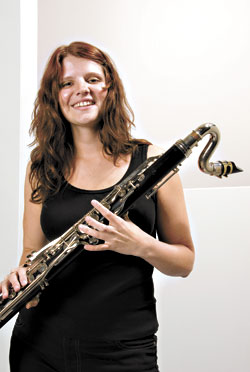Composers learn early on—with hard experience as their teacher, rather than anything in the music-school curriculum—that they have to be their own impresarios. In the new-music world, you make many more opportunities than you’re given: You recruit your own players, make your own recordings, stage your own concerts. I’ve sometimes wondered if it would be more helpful for music departments to skip the fourth-species counterpoint and teach students how to quickly and quietly move music stands and stack folding chairs.
Composer/clarinetist Beth Fleenor, equally energetic behind the scenes as onstage, is a good example, not only running her own career but working for other musicians. In addition to her day jobs in communications and outreach for the Cornish College of the Arts, she’s the founder of the Frank Agency, an arts-management company specializing in new music, taking care of grant writing, booking, concert production, and promotion for clients like Wayne Horvitz and the Degenerate Art Ensemble. The DAE’s Joshua Kohl raves about her rare combination of musical and administrative skills, calling her “absolutely quirky, creative, and unique, and at the same time the most driven, organized, and on-top-of-her-game person you can find.”
Fleenor was one of the movers behind the avant-garde music series Sounds Outside, which drew music fans and passers-by (an estimated 1,200 of them for the final show on Aug. 4) to Cal Anderson Park on three Saturdays this past summer. It was not only a chance to get this esoteric genre outside the club orbit and into new ears, but a musical opportunity for Fleenor as well—a place to experiment with some of the ideas about sound in space that have been preoccupying her lately. Of her improv trio, Figeater, she says, “The environment dramatically shapes our repertoire, and I love playing around with that. We’re actually toying with the idea of billing the band as a quartet, with the environment as our fourth member.
“For example, at the park concert where we had no reverberant elements, we performed from a very aggressively raucous place, with a lot of hits/punctuations throughout the improvisations, interjecting dense rhythmic cells that require a dry space to be heard clearly, and I used a lot of delay effects on my voice and sometimes on the bass clarinet.”The trio’s Aug. 23 performance at the Good Shepherd Chapel demanded a different approach: “Because it is such a resonant space, it’s important to play more spaciously. Because we’re an amplified ensemble, and I’m dealing with vocal effects, all of those things start to build up on each other when you’re improvising. You get a lot of sound going, and in a space like that, there’s nowhere for it to go; it’s all coming back to you. So you play one note, and you add another note to it, and that combination sits there for a really long time; you have to honor that compositionally.”
Says Figeater guitarist Jeff Huston, “She is wholeheartedly open to experimentation. I can bring in some weird pile of electronics, have my guitar tuned down to a floppy mess of strings, and we can just start playing and something interesting will come out.” Their June 2 Sounds Outside performance demonstrated exactly that. In one passage, Fleenor spun a long, shakuhachi-scented melody on the bass clarinet over Mike Hams’ rustling, chiming percussion (daringly, it was downright pretty, not a term often associated with free improv), while later her singing/chanting was visceral, convulsive, and more than a bit creepy and employed a vocal percussion technique she calls “Beth-boxing.”
Fleenor’s traditional school-band upbringing in Bristol, Va. (home of some of the earliest Carter Family recordings in the ’30s, and so known as “the birthplace of country music”), began with a little coercion: “I wanted to play other instruments, but [the band director] felt that my jaw structure somehow lent itself to clarinet….It turns out he knew what he was talking about, and then I was hooked.” Once she started developing her skills (including spending an intensive six months solely on the Mozart concerto her junior year), she started to feel a disconnect between the music she was studying and the music she listened to—Zappa and classic rock (soaked up during laser shows at the planetarium her father ran). Improvisation, she found, could be her bridge between worlds, and her search for a place to do that led her to Cornish right out of high school at 17.
“I was always frustrated,” she admits. “I had a lot of technical facility under my hands which was really not at the same place as my ears….It felt stifling.” So she enrolled in every performance class Cornish offered: Brazilian, bebop, chamber music with Paul Taub. But she also started getting involved in the music business, working in the office of Cornish music department Chair Laura Kaminsky—”it was as interesting to me as performing”—and was considering switching to an arts administration major until Taub staged an intervention: “I can’t thank him enough for doing this, but [he] took me out for a coffee and said, ‘No way. Don’t do it; you’re a clarinet player, you need to perform.’ “
Soon after, she did find a regular outlet for her creative side, hooking up with sympathetic musicians in the Monktail Creative Music Concern (which put on the Sounds Outside series), and her two careers have developed in parallel since. Even in her bachelor’s degree recital, Fleenor worked for the cause, forgoing standard repertory and commissioning 10 new works from composer colleagues for herself to play. Her collaborations with pianist Denney Goodhew, under the name Bling, have been more peaceful, more introspective: chamber music, as Fleenor thinks of it, as opposed to the “avant-jazz noise rock” of Figeater. Another project with violinist Paris Hurley, in embryo (dubbed Double Yoko because when they met, they had both just weathered a band breakup), will include movement, guest artists in various disciplines, and a strong visual art/installation component.







